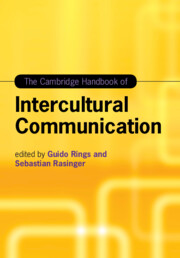Book contents
- The Cambridge Handbook of Intercultural Communication
- Cambridge Handbooks in Language and Linguistics
- The Cambridge Handbook of Intercultural Communication
- Copyright page
- Contents
- Figures
- Tables
- Contributors
- Acknowledgements
- Introduction
- Part I Introducing Intercultural Communication
- Part II Theoretical Approaches
- Part III Methods
- Part IV Application
- 22 Intercultural Communication in the Context of the Hypermobility of the School Population in and out of Europe
- 23 Culture and Management
- 24 Language and Othering in Contemporary Europe
- 25 Black British Writing
- 26 Cultural Encounters in Contemporary Latin American Cinema
- 27 Religion and Intercultural Communication
- 28 Irish–English Cultural Encounters in the Diaspora
- 29 Intercultural Dimensions in Academic Mobility
- Part V Assessment
- Index
- References
28 - Irish–English Cultural Encounters in the Diaspora
from Part IV - Application
Published online by Cambridge University Press: 18 February 2020
- The Cambridge Handbook of Intercultural Communication
- Cambridge Handbooks in Language and Linguistics
- The Cambridge Handbook of Intercultural Communication
- Copyright page
- Contents
- Figures
- Tables
- Contributors
- Acknowledgements
- Introduction
- Part I Introducing Intercultural Communication
- Part II Theoretical Approaches
- Part III Methods
- Part IV Application
- 22 Intercultural Communication in the Context of the Hypermobility of the School Population in and out of Europe
- 23 Culture and Management
- 24 Language and Othering in Contemporary Europe
- 25 Black British Writing
- 26 Cultural Encounters in Contemporary Latin American Cinema
- 27 Religion and Intercultural Communication
- 28 Irish–English Cultural Encounters in the Diaspora
- 29 Intercultural Dimensions in Academic Mobility
- Part V Assessment
- Index
- References
Summary
Bronwen Walter draws on sociological concepts in its exploration of hidden nuances in relationships between Irish migrants and their descendants on the one hand and people of English background on the other. The chapter draws on qualitative data from ten discussion groups with second generation Irish ‘experts’ in four locations in England – London, Manchester, Coventry and Banbury. Four themes are identified which illustrate major areas of cultural difference: language, religiosity, the importance of family and sociability. The author argues that the widespread failure to recognize them has led to inequalities in many parts of society.
- Type
- Chapter
- Information
- The Cambridge Handbook of Intercultural Communication , pp. 460 - 474Publisher: Cambridge University PressPrint publication year: 2020



